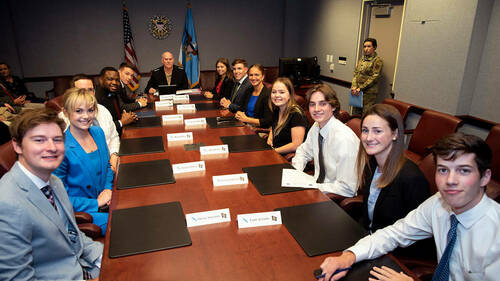
University of Notre Dame students traveled to Washington, D.C., recently as part of a government-sponsored program aimed at engaging young minds to solve complex national security problems in new and innovative ways.
A collaboration between the Notre Dame Office of Military and Veterans Affairs and the Department of Defense, National Security Innovation is a three-credit summer pilot course for rising sophomores, juniors and seniors with interests in innovation, national security, technology and entrepreneurship.
Diverse and interdisciplinary groups of students work in teams to develop solutions to a host of national security problems put forth by defense and intelligence community collaborators, conducting interviews and developing and testing solutions in preparation for a final presentation at the end of the summer term in July.
“Through this program, I have experienced firsthand the challenge and excitement that comes from working on current national security issues,” said Michael Ellis, class of 2024. “This opportunity has also shifted my own career goals such that I am now pursuing a different academic path in order to better meet the evolving needs of the national security space.”
For this pilot course, students were asked to address problems in three areas:
- Data privacy — Leveraging open-source, publicly available data for intelligence gathering purposes while protecting individual privacy.
- Workforce development — Managing talent to ensure a highly diverse, intelligent and adaptive civilian national security workforce in the future.
- Strategic influence and perception — Developing ways to track and measure global influencers who shape opinions about America’s national security and operations.
The students spent several weeks on campus before traveling to Washington in late June.
There, they met with stakeholders from the public, private and nonprofit sectors, including Notre Dame alumnus Adm. Chris Grady, vice chairman of the Joint Chiefs of Staff, to learn more about critical issues at the center of both national and global affairs.
The D.C. visit was an intensive immersion designed to help the students better understand the complexity of these challenges, according to Laura McAleer, associate vice president for federal relations at Notre Dame based in Washington.
She added, “They can apply the knowledge gained to approach these challenges in a more informed way.”
“Coming into this course I was interested in the idea of national security, but being a first-generation student with a disability I wasn’t quite sure how I could contribute to the field. Because of the excellent teaching and immersion in Washington, D.C., I found mentors and possible future career paths,” said Nyla White, class of 2025. “Now, I am currently pursuing a national security internship for the fall semester.”
Using methods and materials from the National Security Innovation Network’s Hacking for Defense program, the course is led by John Soares, adjunct assistant professor of history, and co-taught by Regan Jones, director of Notre Dame’s Office of Military and Veterans Affairs; Amanda Leary, of Notre Dame Learning; and Patrick Gibbons, adjunct teaching professor of business.
In addition to collaborating to solve pressing national security issues, students in the course gain awareness of the military and its national security mission and exposure to the wide range of careers available in the highly competitive defense and intelligence sectors.
University and Department of Defense sponsors will evaluate the pilot at the end of the summer, McAleer said. The hope is to offer it on a permanent basis going forward.
For more information, visit omva.nd.edu/national-security-innovation.